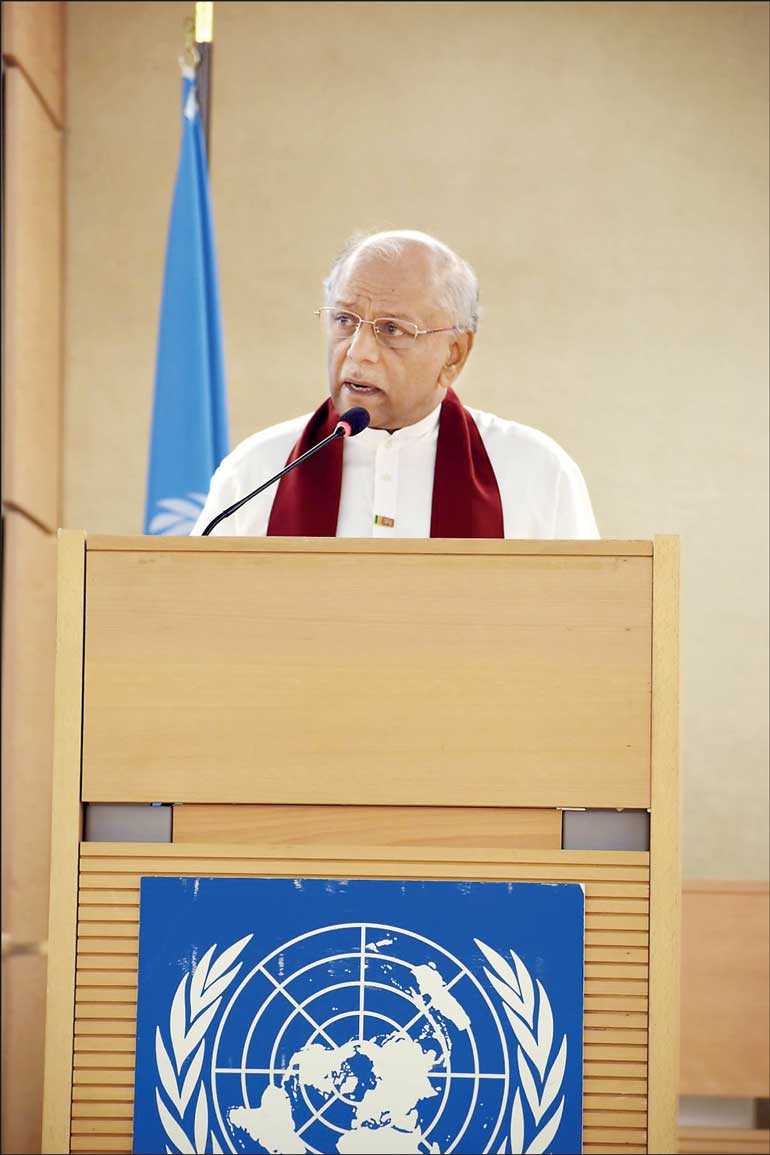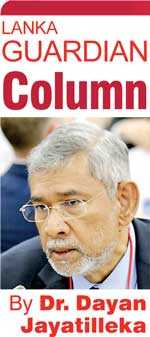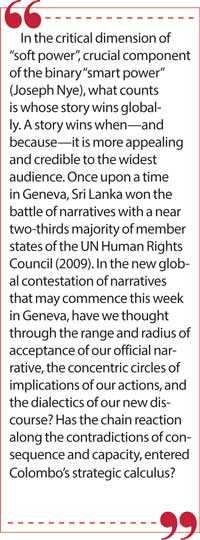Thursday Feb 12, 2026
Thursday Feb 12, 2026
Thursday, 27 February 2020 00:00 - - {{hitsCtrl.values.hits}}

The Geneva 2015 resolution is a hidden tripwire linked to a maze of claymore mines, some buried, some planted in ditches, others nested in trees. When this article appears, Sri Lanka may have nudged that tripwire. There was another, smarter, safer way. 
The Geneva 2015 resolution was explicitly based on and legitimised the utterly tendentious Zaid al Hussein report with its outrageous, unfounded allegation of “system crimes” and its hostile recommendations.
One error cannot be corrected by another, nor one extreme by another, which is why the Buddha urged the Middle Path, and Aristotle, the Golden Mean. By a precipitate unilateral withdrawal from the criminally treacherous co-sponsorship of the ghastly Geneva 2015 resolution, is Sri Lanka extricating itself from a quagmire or sinking deeper into a larger one?
We could have calibrated our moves better. We could have used the negative factor of our co-sponsorship to good effect and flipped it, pointing out that it is precisely as co-sponsors that we wish to constructively propose a raft of corrective amendments—an argument that would be difficult for the Western co-sponsors, the actual drivers of the resolution, to be seen to reject outright without apprehension of unmasking and exposure. We could have used our misplaced co-sponsorship as a handle; leveraged our status of ‘share-holders’. To quote Mao Zedong, we had the chance to “turn bad into good” – or colloquially, lemons into lemonade.
Once upon a time in Geneva
Yahapalana Prime Minister (and eternal UNP leader) Ranil Wickremesinghe recounted the backstory of Geneva 2015 in his after-dinner remarks at a banquet some days or weeks after the passage of the infamous resolution 30/1.
He proudly related that the UK High Commissioner in Colombo, James Dauris who was in the audience (and had disclosed to another audience that he had befriended Wickremesinghe when he spent time Sri Lanka in 1983 as a student) had complained to him of the sluggishness of GoSL in signing on as co-sponsors of the resolution because our diplomats in Geneva at the September 2015 session, Ambassadors Ariyasingha and Azeez were irresponsibly nit-picking (i.e. responsibly negotiating) during the interactive dialogue on the draft. Wickremesinghe related that he got through to Ambassador Ariyasingha and instructed the latter to instantly sign-on to the resolution as co-sponsor.
The UNHRC’s resolution 30/1 on Sri Lanka is dated Oct 1st 2015. Shortly after, the then PM made a solo address to the media. YouTube still features the Ada Derana video dated 3 October 2015 of that media conference which bears the curious caption “Ranil explains why Dayan Jayatilleka opposed Resolution” with a narrative which reads: “Prime Minister Ranil Wickremesinghe explains why former Sri Lankan Ambassador/Permanent Representative to the UN in Geneva, Dr. Dayan Jayatilleka, opposed the UN resolution on Sri Lanka.” The Prime Minister’s critique of me was followed some weeks later by the then Foreign Minister Mangala Samaraweera, in Parliament and on TV talk-shows.
In the years 2013-2015 that preceded the October 2015 Resolution I had been a staunch public critic of the disastrous policy adopted at the UNHRC in the post-war years, the second Rajapaksa term, that led to defeats in Geneva three years running—2012, 2013, 2014; serial defeats that paved the way for the abject Ranil-Mangala surrender of 2015.
I must confess I had (and have) a more than academic or analytical interest in the continuing Geneva case. I was Sri Lanka’s Ambassador/Permanent Representative to the UN at Geneva during the war years 2007-2009, and when the first accountability-centred Resolution on Sri Lanka was sought to be moved by the West. The Economist (London) mentioned “…Dayan Jayatilleka, Sri Lanka’s Ambassador to Geneva, who warded off the threatened UN war-crimes probe in May…” (‘Sri Lanka after the war: Behind the Rajapaksa Brothers’ Smiles’, 8-14 August 2009 issue, p 43). In 2009 we succeeded in persuading a near two-thirds majority at the UNHRC to support Sri Lanka’s cause.
In my public campaign against the Sri Lankan Government’s capitulationism in co-sponsoring the outrageous Geneva 2015 resolution, I had proposed a ‘revisionist’ counter-strategy through which we could asymmetrically resist and peel back that resolution. While a UN Resolution can be repealed only by another, and our medium-term aim should be to reconstruct our winning coalition of 2009 and roll-back the resolution, in the immediate/short run, the Resolution should be ‘raided’, or less dramatically, ‘thawed out’ and diluted, through reasonable amendments consensually arrived at and collectively moved with our friends.
When I presented this perspective at OPA panel discussions and other public (and closed door) forums on Geneva, as well as in the media, I was opposed by a Sinhala hardline caucus including ex-military brass, former senior diplomats and columnists who had an entirely different perspective; a ‘rejectionist’ one, linear and frontal, without transitional intermediate steps but with markedly insular, nativist inflections and latent neo-isolationist tendencies.
Sovereignty and accountability
In the international system which remains fundamentally the global inter-state system, it doesn’t matter if you have changed your government through elections; your commitments are as a state. However, for a state, national sovereignty is one of the highest values, if not the highest. For a democracy, the people’s sovereignty is the heart of the matter. For the United Nations, UNHRC, UNESCO and most UN/UN-affiliated organisations, the highest values are universal human values, such as human rights. While a Platonic philosopher-ruler or Gramscian Modern Prince may strive to synthesise these doctrines, a “principled pragmatism” (Richard Falk) requires leaders and policy makers to balance and accommodate these four legitimate principles.
National sovereignty isn’t an empty word to be mocked at as Mangala Samaraweera does, but it is not a mantra to be chanted as if it has absolute value because it does not, or is the highest possible value because it is not. In actuality, national sovereignty is relative to the asymmetries of positions and strengths in the world order structured by uneven, unequal, hierarchical power relations and practices—as anyone acquainted with the (Thucydidean) Melian Dialogue, a paradigmatic text of Realism, would know.
The only way for the relatively smaller and weaker to resist and countervail such systemic and structural asymmetry is by the ‘judo throw’ of reverse asymmetry, i.e., of moral-ethical hegemony, gaining and holding the moral high ground in the eyes of world public opinion, not merely in one’s own narcissistic gaze. Smaller nations and oppressed peoples prevail primarily “by bringing to bear a certain moral force, the collective moral force and decency of human beings”. (SWRD Bandaranaike, UNGA New York, 22 November 1956)
The five-point statement of the Cabinet on the government’s planned unilateral withdrawal from co-sponsorship of the Geneva resolution includes a promise to appoint a Justice of the Supreme Court to review the existing or previous Commissions of Inquiry and identify “deliverables”. These previous commissions surely include the LLRC and the Maxwell Paranagama-Sir Desmond de Silva  Commission, both of which were appointed by President Mahinda Rajapaksa in his second term. It is difficult to imagine that former A-G CR de Silva or stellar international lawyer Sir Desmond de Silva QC would have recommended the legally (as distinct from ideologically) “undeliverable”. How can the administration credibly promise an ‘indigenous mechanism’ while refraining from a concrete commitment to implement the recommendations of the last two indigenous commissions appointed by President Mahinda Rajapaksa? Why re-invent the wheel of an ‘indigenous mechanism’?
Commission, both of which were appointed by President Mahinda Rajapaksa in his second term. It is difficult to imagine that former A-G CR de Silva or stellar international lawyer Sir Desmond de Silva QC would have recommended the legally (as distinct from ideologically) “undeliverable”. How can the administration credibly promise an ‘indigenous mechanism’ while refraining from a concrete commitment to implement the recommendations of the last two indigenous commissions appointed by President Mahinda Rajapaksa? Why re-invent the wheel of an ‘indigenous mechanism’?
Our Geneva 2009 success bought Sri Lanka three years at the UNHRC. The monumental original folly for which the price is still being paid open-endedly, was committed within a mere six weeks of the 29-12 vote, namely, disbanding the winning team and dismantling our diplomatic defensive ‘Great Wall’—which the West could not breach—that could have secured Sri Lanka in Geneva for many years more. Notwithstanding that expensive blunder, had CR de Silva’s Nov 2011 LLRC Report been briskly implemented we would have been off the accountability hook, averting the triple defeats of 2012-2014 and dodging the Geneva 2015 bullet. A firm, time-bound commitment to the full, fast-track, transparent implementation of both the LLRC and Paranagama Commission Reports is the only conceivable quid pro quo and viable defence line for Sri Lanka in Geneva.
Kicking the accountability can way down the road while unilaterally renouncing co-sponsorship of the 2015 UNHRC resolution may play into the hands of our country’s governmental critics and non-governmental foes, triggering calls for international and/or individual national responses to accountability issues on the grounds that the Sri Lankan State has pulled out of partnership in/commitment to a UN resolution, however surreptitiously or misguidedly entered into. Unilaterally wrenching away may activate the recommendations of the Zaid al Hussein Report, including his call to all member states of the UN to proceed against Sri Lanka under the rubric of Universal Jurisdiction.
Unilateralism and blowback
Two countries which have resorted to unilateral action including unilateral withdrawal in recent years are the USA under President Trump (and in one instance, that of the ABM Treaty, under President George W. Bush) and Israel, especially under Netanyahu. Such unilateralism has not won these two states any friends or votes at the UN, but they can perhaps afford to overlook such factors. Sri Lanka cannot. The USA and Israel are immune from retaliation for their acts of unilateralism, including walkouts. Not so Sri Lanka.
What does it mean to exit the co-sponsorship but not the resolution? Does SL remain ‘in compliance’? Imitating the USA in its unilateralism under President Trump and justifying it by seeking refuge in the Niki Haley-Netanyahu line on UNHRC resolutions will neither placate the US nor sit comfortably with our consistent allies who cherish multilateralism as methodological principle and the UN system as an institution. The US for its part is likely to be affronted—Washington is on a hair-trigger these days—and determined not to allow such an action to go without retaliatory response, for concern that it may send the wrong signal.
If you find yourself standing on a landmine, you don’t just jump off—experienced experts have to painstakingly deactivate the pressure-sensitive mine. Instead of being limited to and contained in the relatively secure intergovernmental body, the UNHRC in Geneva, where the stakeholders are member states, the Sri Lankan issue could now spill over, be globalised. There could be negative reverberations in various national legislatures, especially in the Western world. Spaces of critique and contestation could open up and proliferate—sites for multiple initiatives and offensives by coalitions of Tamil diaspora lobbyists, international civil society, the media, jurists engaged in “lawfare” (legal warfare), political personalities, legislators, officials and agencies of foreign governments/states, including state, regional and local administrations. Inflows and markets could be impacted by these external dynamics and opinion shifts.
However just one’s cause is in one’s own eyes and those of one’s parochial constituency, one must ensure that most or much of international opinion sees it in the same way. This is where persuasion on the basis of reason, ethics, knowledge and credibility proves the best method. My published political research and experience lead me to conclude that successful resistance against injustice and hegemonic imposition must have five characteristic features: it must be recognisably rational and reasonable; it must hold the moral-ethical high ground, representing the higher and greater good of humanity as recognisable by universal norms; it must be demonstrably feasible by international ‘best practices’; it must unite more than it divides i.e., be broadly consensual and coalitional in character; it must be intelligent, in that it does not prove counter-productive by generating consequences worse than those which our actions intend to prevent or liberate us from.
In the critical dimension of “soft power”, crucial component of the binary “smart power” (Joseph Nye), what counts is whose story wins globally. A story wins when—and because—it is more appealing and credible to the widest audience. Once upon a time in Geneva, Sri Lanka won the battle of narratives with a near two-thirds majority of member states of the UN Human Rights Council (2009). In the new global contestation of narratives that may commence this week in Geneva, have we thought through the range and radius of acceptance of our official narrative, the concentric circles of implications of our actions, and the dialectics of our new discourse? Has the chain reaction along the contradictions of consequence and capacity, entered Colombo’s strategic calculus?
[Dr. Jayatilleka was Sri Lanka’s Ambassador/Permanent Representative to the UN at Geneva (2007-2009), was elected a Vice-President of the UN Human Rights Council (2007/2008) and Chairman of the Governing body of the ILO (2007/2008). He is the author of ‘Protracted Asymmetric Geopolitical Conflict’, RIAC (Russian International Affairs Council) Sept 2019 and Modern Diplomacy, Oct 2019.]